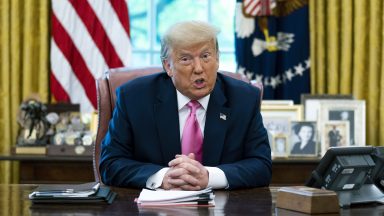How Many Federal DEI Employees Are There in the U.S.?
Donald Trump issued an executive order when he took office in January 2025, removing Joe Biden's DEI programs in the government.


DEI federal employees were placed on paid leave by Donald Trump shortly after he took office again on January 20, 2025, as part of a new executive order. Trump’s administration is prepared to shutter all DEI-related programs in the government, in addition to removing all websites, social media accounts and anything else in connection with those DEI offices. So, how many federal employees will be affected by Trump’s DEI program removal?
Learn more about the situation below.
The Meaning of DEI
The term “DEI” stands for diversity, equity and inclusion. Under Biden’s administration, he expanded federal workplace protections by signing executive orders during his presidency. His orders extended to federal workers who were pregnant, were military spouses, caregivers and other groups of people. Trump and other critics claimed the federal DEI programs were discriminatory against certain groups of Americans, including white individuals.
What Is Trump’s Executive Order on Federal DEI Employees?
President Trump has directed the FAA to prioritize safety with merit-based hiring, ending discriminatory DEI practices.
This restores fairness, competence, and confidence in air travel for all Americans. pic.twitter.com/ahffbaeHSG
— The White House (@WhiteHouse) January 22, 2025
Trump vowed in his inaugural address that the United States will be “colorblind and merit-based.” According to the White House, Trump indicated his executive order was to “return to non-discriminatory, merit-based hiring,” specifically in the Federal Aviation Administration (FAA). Trump claimed that the FAA prioritized hiring based on diversity, equity and inclusion above safety and efficiency.
“Almost unbelievably, as a diversity, equity, and inclusion (DEI) initiative, the Biden FAA specifically recruited and hired individuals with ‘severe intellectual’ disabilities, psychiatric issues and complete paralysis over other individuals who sought to work for the FAA,” the executive order states.
The White House further described DEI programs as “illegal and dangerous” and indicated its “promise to end illegal discrimination and bring back common sense.”
“Americans deserve a government committed to serving every person with equal dignity and respect, and to expending precious taxpayer resources only on making America great,” Trump said as part of his DEI executive order.
How Many Federal DEI Employees Are There?
According to multiple outlets such as BBC, it’s unclear how many federal employees will be affected by Trump’s DEI executive order. Under this new order, federal agencies must create a list of all DEI offices and its workers, and the agencies must submit a “written plan” to start layoffs of DEI program employees.
In his executive order, Trump noted he will “terminate, to the maximum extent allowed by law, all DEI, DEIA, and ‘environmental justice’ offices and positions (including but not limited to ‘Chief Diversity Officer’ positions)’ within the government, meaning that any employee attached to these labels will lose their jobs.
The U.S. government offers more than 2,000 federal assistance programs to the public, according to Government Book Talk.
Shortly after they were placed on leave by the Trump administration, several DEI employees anonymously shared their reactions with NBC News.
“When you decide to become a civil employee, your goal is to really help the American people. And anyone who’s in this line of work knows that the goal is to always help all people,” one anonymous female worker told the outlet “It’s disheartening that we’ve become pawns in this grapple for control. But, again, this is what the American people voted for.”
Another DEI employee, who had been working for the government for 23 years, told NBC that he fears his job could be eliminated now that he’s on leave.
“I was a little gay boy in the South. I felt displaced and different and othered and not comfortable in my home or in my skin for a lot of years,” he explained. “I also grew up on the poorer side … It just made me want to use what privilege I have in order to improve areas for folks who don’t enjoy privilege in those areas.”

 Astrong
Astrong 































